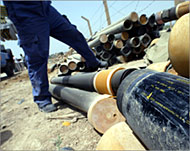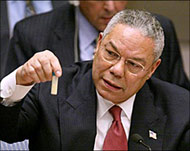The ABC of WMD
Weapons of mass destruction have become one of the great political topics of the day.

What are they? Who has them? Who wants them? Who wants to get rid of them? What will happen next?
What are WMD?
The term weapons of mass destruction was first used to describe atomic weapons, especially hydrogen bombs (H bombs) developed in the 1950s.
All nuclear weapons work by finding atoms such as uranium and plutonium that can most easily be split, and then banging them together with high explosives so that the atoms break apart in a chain reaction, causing a huge explosion.
H bombs use a two-stage process that can make a single explosion larger than all the high explosives used in the whole of the second world war.
Radioactive material can also injure people by itself and the so-called dirty bomb of high explosive mixed with radioactive material has been suggested but never used.
Biological weapons are the deliberate use of disease in war.
These weapons have been used from time to time in history. In olden days armies might catapult rotting flesh into cities under siege hoping to kill the inhabitants with disease.
The US army gave Indians blankets infected with small pox to kill them. And in the second world war the Japanese made use of biological weapons on China.
The US, USSR and other states developed these weapons during and after the second world war but never used them. Any disease can potentially be used in this way.
 |
|
The US and USSR developed many |
As with most diseases, well fed, healthy people with access to good health services have a much better chance of survival than others.
The fear of disease spreading to infect everyone, including the people using them, has been the main reason for their lack of use.
However the great fear that disease causes is an effect of WMD that exists even when their use is threatened, especially since modern medicine has done away with so many diseases that were common throughout history.
Chemical weapons were used extensively in the first world war especially by the British, Germans and French.
The British and especially the Italians made use of them in colonial wars in the 1920s and 1930s.
|
“The vast majority of atomic weapons are held by the US and Russia.” |
Various types of chemicals can be used, some cause the skin to blister, some stop the lungs working and some destroy the body’s nervous system. Chemical weapons were used extensively by Iraq against Iran in the war of the 1980s.
Atomic weapons are uniquely destructive. They are reliable, whereas biological and chemical weapons often don’t work if it is too hot, too cold or the wind is going the wrong way.
Atomic weapons combine a huge explosion with heat and blast with the radioactive poison left afterwards, whereas chemical and biological weapons rely solely on poison or disease.
Chemical weapons in particular can be less damaging than high explosive weapons because of the vulnerability to climate conditions.
 |
|
US Secretary of State Colin Powell |
These weapons can in principle be fitted to planes, missiles and cannon.
Who has WMD?
The vast majority of atomic weapons are held by the US and Russia. They each have more than 10,000. Thousands of these can be fired within 45 minutes of the order to launch and have the power to destroy civilisation and the global environment.
China and France have a few hundred. Britain has a couple of hundred reliant on US technical support.
India, Pakistan and Israel have perhaps under 100 each.
The US has arrangements with Belgium, Italy, Germany, Turkey, Greece and the Netherlands to supply nuclear weapons to these nations’ air forces in time of war.
No country admits to having biological weapons.
Iraq was found to have developed an extensive programme of biological weapons before the 1991 Gulf war.
The Soviet Union admitted that it had built many biological weapons to be fitted to missiles, in violation of its international legal obligations.
Who wants WMD?
The countries that have them wish to keep them.
China, France, Russia, the UK and the US are members of the nuclear non-proliferation treaty which obliges them to negotiate the elimination of their weapons. No such negotiation is taking place.
 |
|
China, France, Russia, the UK and |
India, Israel and Pakistan are not part of any UN treaties on their WMD.
Some states are believed to be trying to obtain WMD. The US has concentrated attention on Iran and North Korea.
Previously the US made much of the desire of Saddam Hussein to rebuild his WMD capability.
Now that it is clear that regardless of Saddam’s intentions, the UN had been highly effective in preventing any new Iraqi WMD programmes, US claims appear fraudulent.
In the meantime Iran and Libya are apparently giving up their WMD ambitions in favour of better political relations with the world as a whole.
There has been much recent attention to the secret supplier network run by Pakistan’s Abd al-Qadir Khan to Libya, Iran and other states.
It may be that he also provided supplies to other nations the US would rather not talk about in public. Such states might theoretically include Turkey and Saudi Arabia.
Nor should one assume that other nuclear states such as India do not have companies engaged in covert nuclear trading.
Al-Qaida too has stated nuclear ambitions and it has sought to engender fear by claiming to have ready made ex-Soviet nuclear weapons.
Who does not want WMD?
The vast majority of nations have renounced atomic, biological and chemical weapons and are signatories to the three UN treaties governing them.
 |
|
Most nations have accepted UN |
These are the nuclear Non-Proliferation Treaty (NPT), the Biological Weapons Convention (BWC) and the Chemical Weapons Convention (CWC).
The key reason for states opposing WMDs of all kinds is that they recognise their potential to devastate the whole of human civilisation.
It is possible to think that these weapons might be used on a relatively small scale, but the tendency in war is for a rapid increase in violence.
In essence, as the great scientist Albert Einstein pointed out, nuclear weapons have changed everything except our way of thinking. Thankfully, some states have begun to think differently.
Egypt for example was a leading state in creating the NPT in the 1960s. Some states with nuclear programmes including Argentina, Brazil, Taiwan, South Korea, South Africa, and Ukraine gave them up in order to increase their security.
Most recently, Libya and apparently Iran are following a similar policy.
In the UK and the US there has long been great dissent against their nations nuclear weapons and this helped create a number of key Treaties with Russia to at least limit these weapons in the Cold War.
In April the next UN conference on implementing the NPT is to be held in Geneva.
The head of the UN nuclear inspectorate Muhammad Al-Baradai and Nobel Peace Prize winner, Sir Joseph Rotblat wrote in the Financial Times this January that now was the time to begin serious negotiations to remove WMD entirely from the Middle East, including those that may be held by Syria, Israel and other states.
It will be interesting to observe the discussion in Geneva.
Dan Plesch is a research fellow at Birkbeck College, University of London